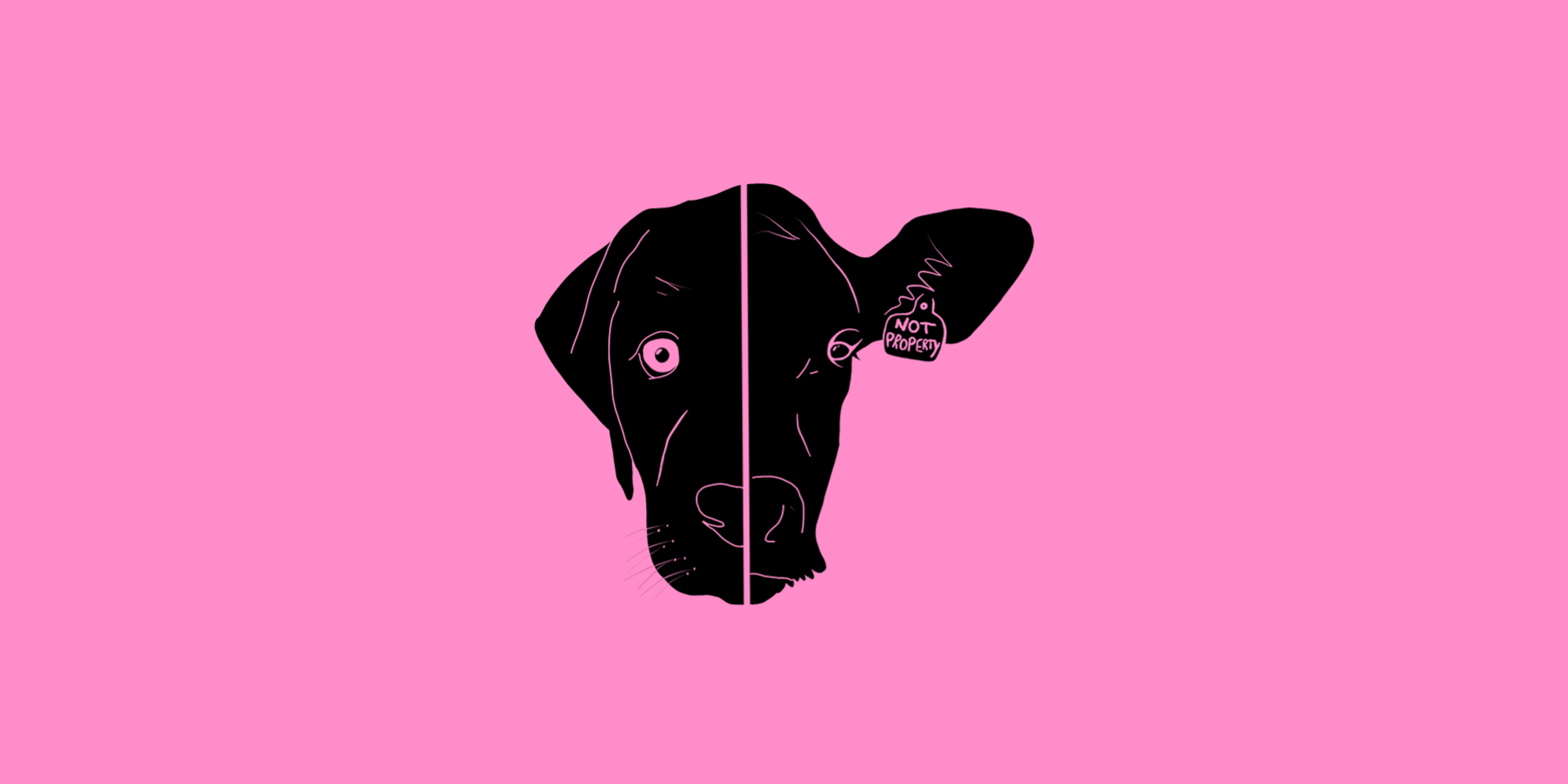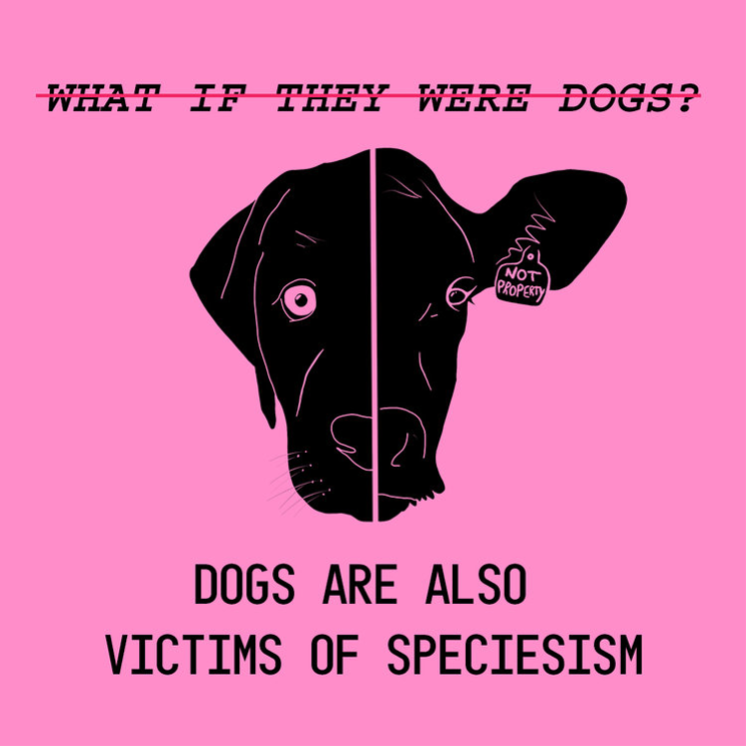
The Problem with Dog Analogies in Antispeciesism
“What if they were dogs?” is something we hear a lot in vegan outreach, at least in “Western” countries. The person will be showing footage from an enslavement or slaughter facility and asking the member of the public, “what if they were dogs? Would you feel any differently?” Dog comparisons are common, and there’s a reason for it: a lot of humans love - or think they love - dogs. In the “West”, we are socialised around dogs; we are conditioned to see them differently than we see other nonhuman animals. Dogs are used as pets; they are friends; they are family members. Dog comparisons allow the person being outreached to transpose what they are seeing to someone that they care about, and to ask themselves, “if I wouldn’t want to harm a dog, why would I harm a pig?” And yet, as effective as they might be, those comparisons are problematic. Here’s why:
1. It implies that it doesn’t happen to dogs
When you say “what if they were dogs,” you’re implying that it’s not happening to them. And that’s factually wrong: even though “Western” human society uniquely sees dogs and doesn’t exploit them for food, dogs are still victims of speciesism, sometimes with extreme violence. Beagles are tortured in vivisection; greyhounds and lurchers are enslaved and murdered in the racing industry; dogs are put in dangerous situations and trained to be aggressive by hunters, the police, or the military; dogs living independently within human communities are captured and put into shelter and killing facilities where they will most probably be “euthanised” (this is the word that these facilities use, but euthanasia without consent can only really be called murder); they are bred in large numbers to satisfy our desire for companionship, with mothers and children who do not possess the right traits often discarded like trash; they are denied their natural evolution and genetically manipulated with traits that are desirable to us rather than useful to them, to the point where some dog breeds develop severe health problems as a result of human cosmetic tastes. This list is not exhaustive. Even in the best possible situation, where a rescue dog is adopted into a loving non-speciesist family, they are still legal property with heavy restrictions on their freedom and they are in a position of forced dependency.

2. It blurs the definition of speciesism
By implying that dogs are privileged over other nonhuman animals, or that the dogs exploited as pets are not victims of speciesism, we promote a blurred definition of speciesism. With phrases like “why eat one and love the other,” “where do you draw the line,” or “the only difference is your perception,” we hint at a species-based bias and discrimination, and a system of hierarchy of species, but this is not what speciesism is. Speciesism is not about loving nonhumans from certain species and violently exploiting others, it is the refusal to see people from other species as persons and instead valuing them only for their function. In this speciesist human world, dogs, just like other nonhuman animals, are still valued for their function rather than as persons, whether that function is as a pet, a job they did not agree to, or something more nefarious. As anti-speciesists, we should always make it clear what speciesism is and why we are fighting it.
3. It appeals to speciesism rather than fighting it
Just like using “she’s someone’s daughter” to denounce a (cis-het-man) politician’s sexist remarks is problematic because it appeals to womens’ perceived functions and roles in patriarchy rather than their personhood (in other words, it appeals to sexism instead of fighting it), dog comparisons are problematic because they appeal to speciesism. It’s appealing to a dog’s perceived role as a pet, a companion, an accessory, and questioning why this function is reserved to certain species, rather than asking why nonhumans should have a function at all. Pigs and cows especially are often shown as deserving of rights only because of their similarities with dogs, instead of because they are persons with interests. Anti-speciesists do not want other exploited nonhuman animals to be treated like dogs, i.e. to be exploited differently. We want all animals to be treated as persons and thus, with respect.
4. So what can we do instead?
If you want to use dogs as an analogy, make sure you do it in a non-speciesist way. One possible option could be, when introducing the analogy, to first establish an agreement with your interlocutor that dogs are persons. This can be relatively easy, especially if talking to a human who lives or has lived with dogs and will have themselves observed that dogs have personalities, desires, and interests, just like all animals. So instead of “would you be ok with killing dogs?”, ask “do you believe that dogs are individuals who have inherent value and a right to live?”, and then try to extend that understanding to other nonhuman animals. But why use dogs at all? We could simply ask the person if it would be morally justifiable to use humans as mere resources (side note: capitalism kind of does that), and to explain why not. After all, the reasons why we should not exploit nonhuman animals are the same reasons why we should not exploit humans. We are all animals.
The human who wrote this essay shares their life with their dog companion whom they love dearly. ASA’s (and The Animalist’s) position on living with nonhuman animals is that we are in favour of adopting and fostering individuals who would otherwise be murdered, respecting their status as nonhuman persons, giving them vegan food when possible, and being vehemently against the genetic manipulation and breeding of all nonhuman animals, including — but not limited to — within the pet industry.